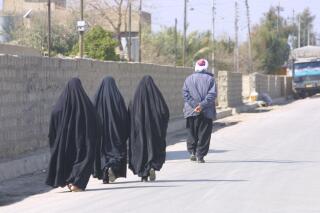Supposed photo of Afghan women is fake; original, from Iraq, was altered to add chains

This February 2003 photo provided by photographer Murat Düzyol shows three women walking behind a man in Erbil, Iraq. A version of this original image was manipulated to digitally add chains on the women’s ankles, with a caption erroneously claiming it was made in Afghanistan after the Taliban took control of the country in August 2021. (Murat Düzyol via AP)
CLAIM: A photo shows three Afghan women chained to one another, walking behind a man who holds the end of the chain.
AP’S ASSESSMENT: False. The photo was manipulated, and the chains were added. Photographer Murat Düzyol told The Associated Press he took the original photo in Erbil, Iraq, in February 2003.
THE FACTS: After the Taliban seized power in Afghanistan on Sunday, false posts began to emerge regarding the experience of women in the country.
Twitter users posted a manipulated photo and suggested that it showed women in Afghanistan walking behind a man. In the edited photo, chains were digitally added onto the ankles of the women, with the man holding the chain. There was no chain in the original photo. Also, it was taken in Iraq, not Afghanistan.
“#AfghanWomen. God protect women and children because an institution like the United Nations has become impotent,” said a Twitter user who tweeted the photo.
Over the years, the photo has been misrepresented and posted multiple times. One blog falsely stated the photo was taken in Afghanistan and said it showed an example of women walking about five paces behind their husbands.
Düzyol, who lives in Istanbul, told AP he took the photo in 2003. During that time, he often visited Iraq and took photos. The day the photo was taken, there was a ceremony commemorating Iraqi civilians who were killed in the city of Erbil, he said.
“As people were returning to their homes after the ceremony, such a composition randomly appeared on the street. It’s a completely instant snapshot and completely natural,” Düzyol explained in an email. “The women obviously knew each other, but I’m not sure they knew the man.”
Many fear the Taliban will reimpose a strict interpretation of Islamic law that was practiced when they ran Afghanistan from 1996 to 2001. At the time, women were barred from attending school and having jobs outside the home. They had to wear burqas and be accompanied by a male relative when they were in public. After taking over, the Taliban said they promise to honor women’s rights within the norms of Islamic law, but many Afghans are skeptical.
__
This is part of AP’s effort to address widely shared misinformation, including work with outside companies and organizations to add factual context to misleading content that is circulating online. Learn more about fact-checking at AP.
